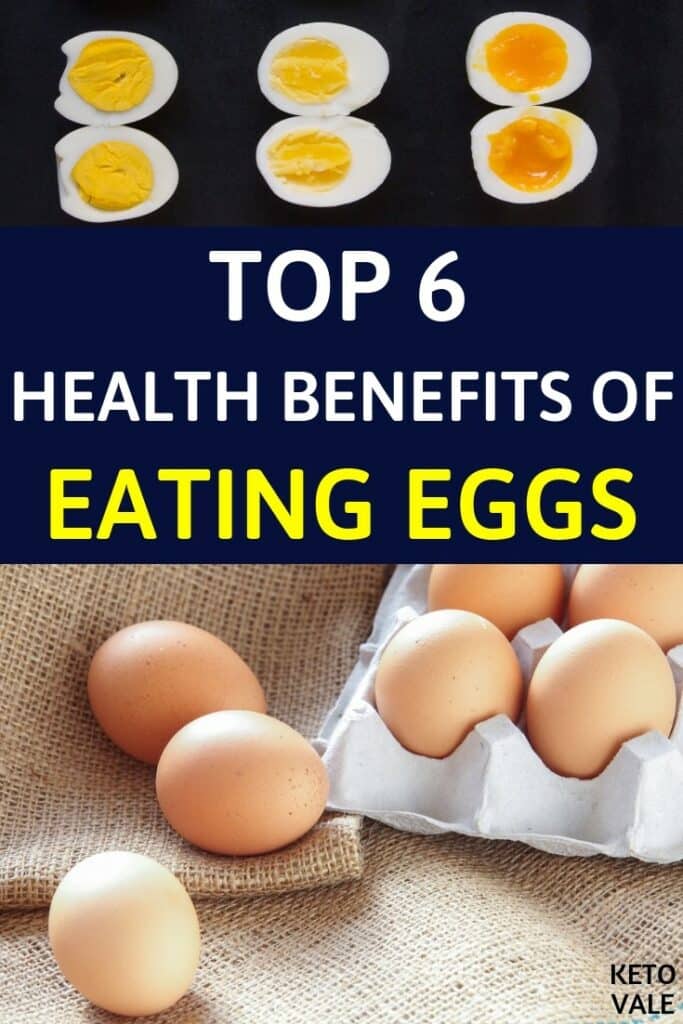Eggs are the perfect healthy food. They contain healthy fats (as long as you eat the egg yolk) and extremely low in carbohydrates. They’re also high in B vitamins, vitamins A and D, and several minerals, such as selenium and phosphorus.
For a long time, egg yolks were shunned because it was believed they raised your cholesterol levels and were bad for your heart. Luckily research has debunked the myth that eggs raise your cholesterol levels (1).
Now, egg yolks are a welcome part of your healthy diet, and people are catching on to the fact that eating whole eggs has numerous health benefits.
Nutrition of Eggs
Many people are shocked to learn that eggs are a good source of several key vitamins and minerals. They also contain omega 3 fatty acids and a good source of protein.
Here is the nutritional information for one large egg (2):
- 71.5 calories
- 5 grams of fat
- 37 mg omega 3 fatty acids
- 0.4 grams of carbs
- 0 grams of fiber
- 6.3 grams of protein
Vitamins:
- Vitamin A 244 IU (5% DV)
- Vitamin D 17.5 IU (4% DV)
- Vitamin E 0.5 mg (2% DV)
- Riboflavin 0.2 mg (14% DV)
- Vitamin B6 0.1 mg (4% DV)
- Folate 23.5 mcg (6% DV)
- Vitamin B12 0.6 mcg (11% DV)
- Pantothenic acid 0.7 mg (7% DV)
Minerals:
- Calcium 26.5 mg (3% DV)
- Iron 0.9 mg (5% DV)
- Magnesium 6 mg (2% DV)
- Selenium 15.8 mcg (23% DV)
*DV = daily value
What is Egg Good For?
Eggs should be a part of your healthy diet. They also come with a long list of proven health benefits.
#1. They raise your “good” cholesterol, which lowers bad cholesterol
There are two types of cholesterol: the good and the bad. Bad cholesterol is known as LDL cholesterol. This is the type of cholesterol that clogs up your arteries and increases your risk of heart disease, heart attacks, and stroke.
On the other hand, your good cholesterol is known as “HDL” cholesterol. Research shows that eating eggs can increase your HDL or good cholesterol, which can help keep your heart healthy.
One study found that subjects who ate eggs for six weeks increased their HDL cholesterol by ten percent (3).
Eating eggs seems to be more beneficial for your heart when you combine it with a low-carb diet (4).
Another study found that when combined with a carb-restricted diet, eating three eggs a day helps improve your atherogenic lipoprotein profile to keep your heart healthy (5).
#2. They contain all nine essential amino acids
Amino acids are referred to as the building blocks of protein. There are exactly 20 different amino acids. Nine of them are considered essential, which means that you need to get them from your diet because the body doesn’t make them.
A food that contains all nine essential amino acids is known as a complete protein. Eggs contain all nine essential amino acids, which makes them one of the few foods that are considered a complete protein (6).
Eating foods that are a complete protein is beneficial because it supports the growth of lean muscle tissue. Amino acids are also needed to restore and repair damaged tissues and cells in the body.
Supplementing with amino acids has been shown to reduce the risk of health problems at various stages of life, such as fetal growth restriction, obesity, diabetes, cardiovascular disease, and metabolic syndrome (7).
Eating eggs and other high quality protein foods regularly means that you won’t need to supplement with amino acids to get their benefits.
#3. They can help you lose weight
Eating foods that are high in protein can help you lose weight. This is because they keep you full for longer, which means you’ll eat fewer calories.
One study found that eating eggs for breakfast helps enhance weight loss. The study took 152 men and women aged 25 to 60 years old with an average BMI of between 25 and 50 (8).
Researchers assigned them to an egg, egg diet, bagel or bagel diet based on their breakfast meal preference. The subjects were asked to eat eggs or bagels for breakfast five days a week for eight weeks.
At the end of the study, the egg diet group showed a 61% greater reduction in BMI, a 65 percent greater weight loss, a 34 percent greater reduction in waist circumference, and a 16 percent greater reduction in body fat percentage than the bagel group.
Additionally, the results found there was no difference in cholesterol or triglyceride levels between the bagel and egg groups. This further supports that idea eggs don’t contribute to factors that cause heart problems as once believed.
#4. They help keep you full so you eat less
As mentioned above, protein-rich foods tend to keep you full for longer so that you eat less.
One study put this theory to the test. Researchers took 30 women between the ages of 25 and 60 with a BMI of at least 25 and asked them to do an overnight fast. The next morning, the women ate either an egg or bagel-based breakfast and then they were asked to eat lunch 3.5 hours later (9).
Food intake was weighed at breakfast and lunch. Satiety was assessed using two questionnaires. Results showed that the egg-breakfast caused greater satiety and significantly reduced short-term food intake when compared to the bagel breakfast eaters.
#5. They can help people with diabetes reduce body fat
Obesity is a risk factor for type 2 diabetes. One way to manage your weight is by eating eggs in place of high-carbohydrate foods, especially if you already have diabetes.
One study found that people with diabetes who regularly ate eggs significantly improved their waist circumference and body fat percent (10).
Although the study found that the eggs did not improve glycemic control, other studies show that the ketogenic diet does (11, 12).
This could mean that adding eggs to your ketogenic diet can help contribute to weight loss and the management of diabetes and high blood sugar.
#6. They contain antioxidants
Most people only associate antioxidants with plant-based foods, but did you know that eggs contain antioxidants, too?
Egg yolks are a good source of vitamin A, which acts as an antioxidant in the body to reduce free radical damage and inflammation. Research shows that vitamin A is needed for proper immune function, reproduction, cell communication, and vision (13).
Egg yolks also contain a high amount of lutein and zeaxanthin, which are two antioxidants that are well known for their role in maintaining eye health (14).
Research shows that both lutein and zeaxanthin are found in the lens and retina of the human eye and protect ocular tissues against singlet oxygen and lipid peroxide damage (15).
Due to their free-radical scavenging properties, these antioxidants can also be used to help reduce total inflammation in the body to reduce the risk of inflammatory disorders.
How To Eat Eggs On The Keto Diet
Eggs make the perfect addition to a low-carb diet. They’re extremely versatile and can be used in just about every meal.
Most people eat eggs for breakfast, but you can eat them anytime during the day. You can make hard boiled eggs and eat them with a handful of cheese or nuts as a snack in between meals. Or you could make a vegetable and egg scramble in the oven for a quick and easy meal any time of the day.
You can also learn how to cook eggs in the oven.
Try cracking an egg and adding it to your favorite burger. Avocado egg boats are another popular item on the ketogenic diet. You can make them by slicing open an avocado in half, removing the bit, cracking an egg inside the middle and baking them in the oven. Try topping the egg boat with bacon for a tasty treat.
We have plenty of other recipes you can make using eggs. Check them out here:
- Egg wraps with shrimp salad
- Keto Vietnamese egg coffee
- Poached egg and cheese vegetable frittata
- Keto salmon egg avocado salad
- Keto bacon egg guacamole bunless burger
When picking out eggs, always be sure to go with organic and pasture-raised eggs. This means that the chickens who lay the eggs have access to pastures and are free to roam instead of being confined to a cage.
Keep in mind that cage-free only means that the chickens aren’t caged, but this does not mean they have access to sunshine or space to move around. Also try to pick out eggs from chicken that have never been fed antibiotics, hormones, or other fillers and chemicals.
Conclusion
Eggs are a great food to eat on the ketogenic diet because they are high in good fat and low in carbs. They are also a good source of several vitamins, minerals, and even antioxidants.
Research shows that eggs are NOT bad for your heart as they were once made out to be. In fact, they raise your good HDL cholesterol, which helps clear out the bad LDL cholesterol to protect your heart.
Eggs are also great for keeping your weight down and your waist slim, especially when paired with a low-carb diet. Studies show that eating eggs instead of bagels in the morning helps reduce the amount of food you eat later in the day.
You can easily add eggs to your daily meals by enjoying an omelet in the morning, snacking on hard-boiled eggs in the afternoon, or topping your bunless burger with a fried egg at dinner.
Enjoy this post? Share to save for later!

Photo credit: Torsakarin/Depositphotos.com







